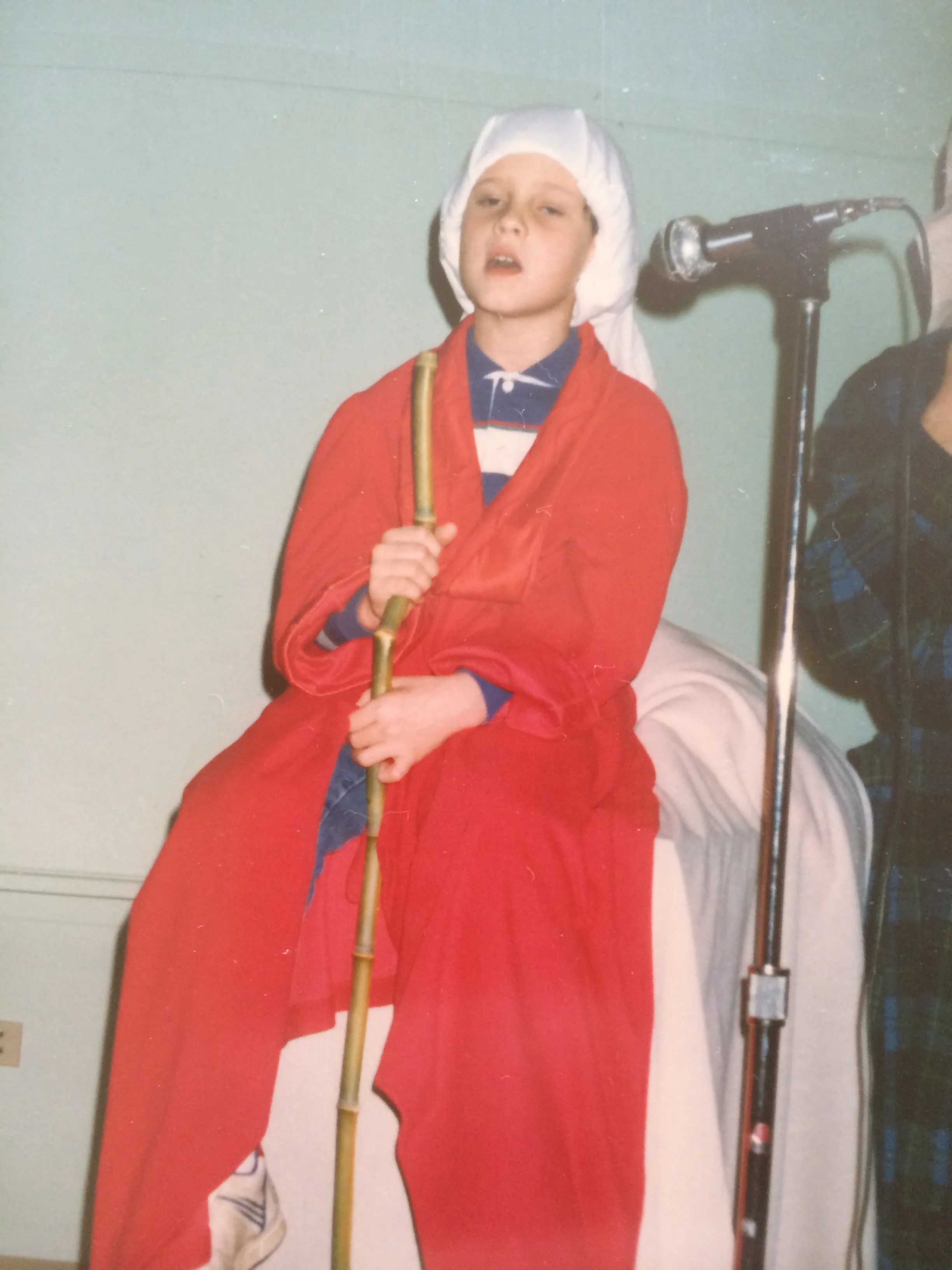The Boy in the Bathrobe: Christmas for Heathens
I have a photograph of myself around the age of eight sitting on the stage of my childhood church, mouth awkwardly agape in song. Wrapped in a crimson bathrobe, a dish towel covers my head and falls to rest on my shoulders. I lean on a bamboo stick that is taller than me.
Most good evangelicals will immediately recognize this depiction as the very historically accurate representation of a Hebrew shepherd circa the year 1 B.C. No nativity play worth its salt would omit this critical character.
In the photo, I’m probably singing “The First Noel” or “Angels We Have Heard on High.” Maybe, if it happened to be a particularly avante-garde year, the director had cast me to sing “It Came Upon a Midnight Clear.”
There would have been an angel, probably the youngest female child in the church capable of memorizing a few lines. She would be wearing silver tinsel-rimmed wings, which themselves were probably constructed of white pantyhose stretched over a pair of wire hangers and bent into a shape resembling the outline of a monarch butterfly.
A narrator on the side of the stage would explain to a quiet but engaged gathering of parents, grandparents, and other churchgoers, that the be-robed boys with the staffs were shepherds abiding in the fields, keeping watch o’er their flocks by night. I wonder now if this was really the life of a first-century shepherd—to sleep in the fields with his ovine wards. Just perpetual camping. Were fences and pens not a thing back then?
Regardless, there they were when lo, a tinsel-trimmed monarchian angel appeared to them in the sky and, sensing their perfectly justifiable fright, attempted to quell their anxiety with some glad tidings that would reset the world’s calendar and forever alter the landscape of human spirituality: that this very day, in the City of David, i.e., Bethlehem, was born a savior. As any number of potential saviors may have been born that night, the angel was especially generous in providing an extra clue to these shepherds-turned-savior-seekers. This particular savior would be snugly swaddled and resting in a feeding trough for stable animals. Skip the local hospital, the angel seemed to advise. Just start poking your head into random barns until you find the one with human occupants.
It was probably at this point the pianist cued me with an intro to the carol I was singing that year. My mom, or maybe my mamaw, snapped that photo, and that moment became part of our family record. There I am, appropriating and anglicizing the dress of a middle-eastern animal care expert, singing about an otherworldly being’s voice floating o’er all the weary world, above its sad and lonely plains.
I think there’s a decent argument to be made that our world is still a weary one, that many of us find ourselves sad and lonely, especially at Christmas time. I do love this season. I love it for the cheesy music and the colder nights we get, even here in San Diego. I love the lights and the seasonal drinks and the photo collages that show up in my mailbox from friends around the world. I love wearing themed clothing, especially now that my style has matured beyond bathrobes and dish towels.
But with each passing year, I find Christmas is tinged with a deeper shade of melancholy. I feel it in the air like I feel the chill of longer, colder nights. The season no longer memorializes just a white-washed story of goodwill for all people. It’s a reminder now of many other things, too—less joyful things.
For some people I know, it’s a reminder of someone they lost—a parent or loved one who died at this time of year, forever taking with them the untarnished yuletide joy that used to accompany the month of December. It can be a reminder of other people who are no longer in our lives, whether through a physical death or, sometimes, a more existential one—estranged family members, homes we were kicked out of, places that excommunicated us.
You might have memories around a tree on Christmas mornings with a family that is no longer together. In your mind, there are siblings or cousins or a grandparent, but in the present, in the here and now, you can’t be with that person for one of a thousand reasons. Someone is incarcerated, or has lost their memory and personality and presence due to an illness or injury. Someone told you to get out of their life—or you told them. Maybe your melancholy comes from wanting to carry on your family traditions with a new generation, but there is no new generation. The children you can’t have, the partner you can’t find.
“Maybe you look at the nativity’s cast of characters and no longer see yourself reflected among them.”
Maybe you just no longer feel at home in the story of Christmas. Maybe the manger makes no sense anymore. Maybe the nativity was once the bedrock of your faith and your identity, and now you look at the cast of characters—an angel, a virgin mother, a shepherd, a wise man—and no longer see yourself reflected among them. I don’t have to imagine the feelings this might cause in you, because I feel them too.
Disappointment, because forget the ever-elusive peace on earth—you can even find peace inside.
Betrayal, because you were told a story that has not resonated as true for many years.
Loss, because this was once the most innocent and joyful of your traditions.
Doubt, at a preposterous tale that a rational and modern person must measure on the scales of science and reason.
Isolation, because something in you can’t connect with the spirit of the season, because “merry and bright” just isn’t in the cards for you this year.
Guilt, for how this might all be your own fault for losing faith.
I look back at the boy in the bathrobe, and I’m flooded with both gratitude and grief. Grief at what it is to know, on this end, all that the intervening years between us would bring—the weary world and its disappointment, betrayal, loss, doubt, isolation, and guilt. And gratitude to know that the boy in the bathrobe was, almost certainly, at that moment the happiest he’d ever been.
For me, this is what Christmas has become: the mingled emotions of heartbreak and hope. Bitter sweetness. Nostalgia and melancholy, symbiotic sentiments that, if I could give them voice, might sound something like an angel’s cry reverberating across a sad and lonely plain.
You might not feel like this season belongs to you. The story might sound like someone else’s. Advent and incarnation may be unapproachable mysteries and it may feel as though you have rescinded your right to a merry Christmas because of a faith you left, or one that left you.
If any of this rings true, may I offer you season’s greetings of my own? If you were to find a Christmas card from me in your mailbox this year, you might open it to read something like this:
As you experience both the gratitude and the grief this December, may you meet melancholy feeling fortified by the memories that make you happiest.
May your disappointments be understood by those around you,
your betrayals known,
your losses comprehended,
your doubts sanctioned,
your isolation recognized,
and your guilt—
may your guilt be the one thing you leave behind this year.
May you know that the inexplicable story of incarnation and advent is still yours, even if you don’t believe it anymore. And may you know that you are not alone in your unbelief, out here in this weary world, across these sad and lonely plains.
As in solemn stillness you lay, may you listen for the song of a tinsel-trimmed angel. And if you don’t hear it, may you feel invited and empowered and free and sing it yourself.

